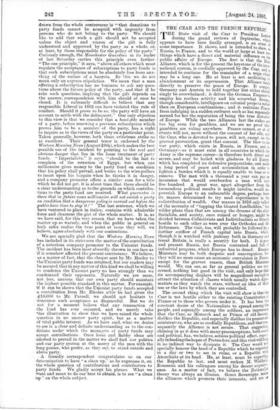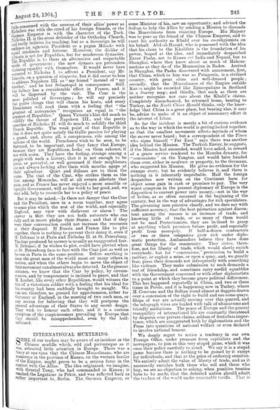THE .CZAR AND THE FRENCH REPUBLIC.
HE State visit of the Czar to President 1,0114.1 during the grand reviews of September, which appears 'to have been finally arranged, is an event of some importance. It shows, and is intended to show. to Russia, to France, and to the world at large at least two things which have a direct and material influence on ese public affairs of Europe. The first is that the Dual Alliance, which is for the present the keystone of the inyes national system, is cordially approved by the Czar, and is intended to continue for the remainder of a reign yalici may be a long one. He at least is not meditating is abandonment or its supersession. That Alliance tenth directly to preserve the peace of Europe. It compel; Germany and Austria to hold together lest either should singly be overwhelmed ; it drives the German Emperor to employ his restless activity and his somewhat dreamt. though considerable, intelligence on colonial projects lath& than on European combinations ; and it restrains France from indulging in a sudden outburst such as has repeatedly earned for her the reputation of being the true disturber of Europe. While the two Alliances last the stakes an too big even for gamblers, and we see no proof that gamblers. are ruling anywhere. France cannot, or at. all events will not, move without the consent of her ally, and the Czar, who is devoted to peace, will not, except on the gravest provocation, grant that consent. The blow to the war party, which exists in Russia, in France, and in Germany—as it must exist in all countries in which the Army is the supreme career—is therefore both direct and severe, :and may be hailed with gladness by all Europe, which has completed its defensive preparations, and needs a long period of peace and accumulation in order to lighten a burden which it is equally unable to bear or to remove. The man with a thousand a year can pay an insurance that would overburden a man with only five • hundred. A great war, apart altogether from the tremendous political results it might involve, would im. poverish Europe to an unbearable degree, perhaps leave its masses determined to try mad experiments in the redistribution of wealth. Our masses in 1816 only talked of the necessity of "tapping the bloated fundholders," but wilder plans than that are 'among the dreams of the abler Socialists, and society, once ruined or hungry, might to divided between Collectivists and Individualists as bitterb hostile to each other as were ever the Orthodox and the Reformers. The visit, too, will probably be followed by a further outflow of French capital into Russia, which. though it is watched with jealousy both in Germany and Great Britain, is really a, security for both. It is poor and peasant Russia, not Russia contented and full of industrial progress, which Europe has to dread. Russian Ministers may be both despotic and _unscrupulous, but they will no more cause an economic convulsion in Russia. except for the gravest reason, than British Ministers would. We. can see, as fax as general politics are con• cerned, nothing but good in the visit, and only hope that its accompanying displays will be magnificent enough to attract the attention of classes which usually watch diplo- matists as they watch the stars, without an idea of their use or the laws by which they are controlled. The> second thing which the visit will show is that the Czar is not hostile either to the existing Constitution of France or to those who govern under it. It has been the constant desire of the Nationalists to spread among the people, and especially among the soldiers, an impression that the Czar, as Monarch and as Prince of old descent dislikes the Republic, and especially dislikes itispresent ad• ministratcrs, who are so cordially Republican, and that con• sequently the Alliance is not secure. That su,ggentinn. . chiming in as it does with many preconceptions, both social and political, has, we believe, serious political effect, espeel• allyinfeeding thehopes of Pretenders, and this visit-will help in no indirect way to dissipate it. The Czar would not specially honour the head of a. Republic which he expected in . a day or two to see in ruins, or a Republic with Anarchists at its head. He, at least, must be expecting the Republic to . last, and must reckon M. %law'' Rousseau and his colleagues among his decent acraint. ante. As a, matter of fact, we believe the National.3' theory was always an illusion. Great. Sovereigns mall the alliances which promote their interests, and are ii-ttle concerned with the sources of their allies'.power as Richelieu was with the creed of his foreign !friends, or the • °avian Emperor is with ,the charact.er. of the Turk. Nicholas IL is the, stout defender of the. Orthodox and really belieYes its teaching, but as a Sovereign he ,will embrace an ,agneatic President or a pagan Mikado with equal readiness and fervour. Moreover, the dislike • of dynasts is not, for Republics, but for mushroom dynasties. The. Republic is to them an, alternative and respectable mode of government ; the new dynasts are pretenders claiming equality with themselves. It would never have occurred to Nicholas I. .te affront a .President, say Mr. Lincoln, on a question of etiquette, but it did occur to him to address Napoleon III. as "my friend " instead of " my brother," and he lost Sebastopol in consequence. Still, the fallacy has a considerable effect in France, and it will be 'dispersed . by the visit. The Czar . is the most polished of Sovereigns ; he will say precisely the polite things that will charm his hosts, and every Frenchman will. read. them. with a feeling that " the greatest of .autocracies e s recognises , equal in " the • greatest of Republice." Queen Victoria's hiss did much to solidify the throne of Islapoleon III., and the pretty speeches Of Nicholas II. will do much to solidify the. third. French, Republic. The weak point , of that Republic is that it does not .stiite satisfy the Gallic passion for playing a (nand, and, . above all, a conspicuous, role among the ri • • • ' nations of the world. Frenchmen, wish to be seen, to be flattered, to be important, and they fancy that Europe, because they are Republican, looks on them askance, if not with scorn. They have the feeling, strange among a people with au& a history, that it is not enough to be great, or powerful, or well governed if their neighbours are not always looking after. them with mouths agape at their splendour. Quiet and dulness are to them the saMe. The visit of the .Czar, who strikes them as the first aniong Monarchd, will at -all. events .alleviate that pain, and as France-1mi never. enjoyed a more, sensible or upright Gevernnient, will so far work to her good,.and, we may add, help to reconcile her to a policy of peace.
But it may be asked,—Is there not danger that the Czar and the President, once in a room- together, may agree to some plan Which the rest of the world; and especially England, may view with- disfavour or alarm ? The answer is that they are not 'both autocrats who can fully and in secret pledge their. States ; and that if they were their conversation could not increase the resources at their disposal. If Russia • and France like to plot together, there is nothing to prevent their doing it, even if I.Delcasse is at Paris and Nicholas II. at St. Petersburg. The fear produced by secrecy is usually an exaggerated fear. JI.-Delcasstl.; if he wishes to plot, could have plotted when at St. Petersburg face to face with the Czar. just as well as he can in 'Paris in the same position. 'Befdre anything is done the great men of the world must. set many others in motion, and when the others begin to move • the object of theirmoYement. can almost alwa,ys be detected. In the present instance, we know that the Czar by policy, by circum- stances, and by temperament. is inclined to peace, and that can see, therefore, no ground. for apprehension, either for rise of a :victorious soldier with a feeling that his ideal for his country 'had 'been . suddeny brought to naught. We :e.raiauny to'r gelave.nryti,otheith- the meetingRepublican, would wtwoulo dsuch men, or any .reason. for _believing that they will postpone the general advantage of their States to any secret design. They wish to honour each other, and it is a, curious symptom of the suspiciousness prevailing in Europe that :hey should be misapprehended, even by the half- .nformed.



































 Previous page
Previous page